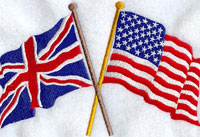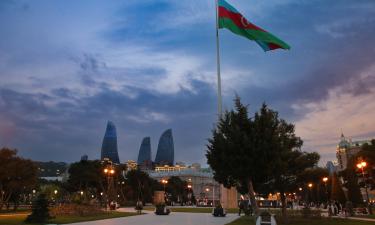Deceitful relationship between US and UK (part II)
... continued.

Click here to read part I
By Ivan Simic
World War I and II
For some time British-American relations had been cool and often suspicious. Various maneuvers from the United States convinced British leaders that the US could not be relied on.
The United States originally pursued a policy of neutrality during the WWI. This resulted in increased tensions with Berlin and London. Both the United Kingdom and Germany engaged in propaganda campaigns designed to win over the United States. The British were able to guarantee a price for American cotton producers. The US was most affected by the loss of trade with Germany and Central Europe.
When a German U-boat sank the British liner Lusitania in 1915, with 128 Americans aboard, the US President Woodrow Wilson vowed, "America is too proud to fight". Americans demanded an end to attacks on passenger ships. Germany immediately complied with the US demands.
Then Britain's secret Royal Navy cryptanalytic group (Room 40), intercepted and decoded “Zimmermann Telegram”, a coded telegram dispatched by the Foreign Secretary of the German Empire, Arthur Zimmermann, on January 16, 1917, to the German Ambassador in Washington, Johann von Bernstorff, at the height of World War I. It was a proposal to Mexico to join the war as Germany's ally against the United States, Mexico rejected proposal.
British revealed the Zimmermann Telegram to the United States, the revelation of its contents in the American press on March 1 caused public outrage that contributed to the United State’s declaration of war against Germany. Wilson called for war on Germany and its allies, which the US Congress declared on 6 April 1917. As a reminder: WW I started in 1914, almost three years before the first US troops arrived in France (1st Division) in June 26, 1917.
Naval rivalry between British Empire, US and Japan and Great Depression marked the era between WWI and WWII.
Special Relationship
Period of the so called “special relationship” between Britain and the United States was about to start.
World War II started on September 1, 1939, when Nazi Germany and the Soviet Union invaded Poland. One week after Molotov-Ribbentrop Pact was signed on August 24. On September 1, Germany invaded Poland from the north, south and west. On September 3, Great Britain declared war on Germany. On September 4, Japan announced its neutrality in the European situation. The United States made a similar declaration the next day. On September 17, the Soviet Red Army in cooperation with Germany invaded eastern Poland.
The American public was strongly sympathetic to the United Kingdom and France fighting the WWII; however, there was also popular demand for neutrality. Two years after the beginning of the WWII, on December 7, 1941, Japanese attacked the US naval base Perl Harbor, which resulted in the US becoming involved in the WWII. After Pearl Harbor was attacked, Winston Churchill's first thought in anticipation of the US help was, "We have won the war”. The US declared war on the Empire of Japan on December 8. Nazi Germany and Fascist Italy declared war on the United States on December 11.
It was expected for the US to enter WWII in 1943; however, German declaration of war opened the door for the US to enter the conflict before.
British Prime Minister Winston Churchill famously described the new bilateral relations between two states as “special relationship”. While Churchill was passionate to promote Anglo-American relationship, the President Truman’s Secretary of State, Dean Gooderham Acheson said: “Of course a unique relation existed between Britain and America, our common language and history insured that. But unique did not mean affectionate. We had fought England as an enemy as often as we had fought by her side as an ally”. Britain starting off as somewhat the senior partner in this relationship, had quickly found itself the junior.
Cold War and Post Cold War
The British and Americans had many disagreements throughout the history, but more was to come. In June 1948, British were fighting in a guerilla war - the Malayan Emergency, the US did not want to intervene. In the Korean War forces from both countries were involved, but were fighting under the UN command. In 1959, the United States opposed the UK in Suez Canal – Suez Crisis (a military attack on Egypt by Britain, France, and Israel on October 29, 1956).
In 1959 Americans went to Vietnam War, British did not want to participate. In 1982, the US supplied the UK in Falklands War; however, British argue that the Americans were practically on the other side during the Falklands War, and that their closest ally was France. Later, the United Kingdom, Canada and the United Nations General Assembly highly criticized the US, Jamaican and the RSS (Regional Security System) invasion of Grenada on October 25, 1983.
In 1991, with the authorization from the UN, a coalition force from 34 countries launched the military strikes against Iraq. The US and the UK had overwhelming majority of the military forces in the Gulf War. Another crisis in the US-UK relationship blew up over Bosnia, the US State Department officials described Bosnia in 1995 as “the worst crisis with British and French since Suez Crisis”. In 1999, the US and the UK were part of the NATO bombing of the Federal Republic of Yugoslavia.
War on Terror
After the September 11, 2001 attacks, the UK showed enormous sympathy for the United States. British Prime Minister Tony Blair became President George W. Bush's strongest ally. The UK military forces participated in 2001 war in Afghanistan and 2003 invasion of Iraq.
An opinion poll during the 2006 Israel-Lebanon conflict found that 63% of Britons felt that the United Kingdom was tied too closely to the United States. Majorities in the UK believe the war in Iraq is unjustified, and in the UK were very critical of the government's support of US policies in Iraq. As a result, the UK currently has 4,100 troops in Iraq, comparing to 45,000 in 2003. Concerning the Afghanistan, a November 2008 poll found that 68% of Britons want their troops withdrawn within the next 12 months.
It has been argued that the UK got nothing from its involvement in Iraq, that the “special relationship” is just a myth and that the relationship between two countries is very one-sided. It has been also argued that the UK is investing more in the US than the US in the UK (British direct investment in the United States totaled $283.3 billion in 2002, the US $255.4 billion). The UK International Development Secretary has recently proposed a change in the current relationship between two states. He emphasized on the need for new alliances, based on common values.
The most recent crisis in "special relationship" between two occurred when British Prime Minister Gordon Brown visited the US President Barack Obama in March 2009, as well as the US disagreements with the UK over Hezbollah. British were very disappointed with Presidents Obama’s treatment and with a 25 DVD box set gift to the Prime Minister Brown when visited White House. On the other side, Americans were angry on the British over the UK Foreign Office decision to talk to political wing of the Hezbollah, which the US considers terrorist organization.
Looking at these historical facts we can see that there is nothing special in the relationship between these two nations, only ongoing disputes. Knowing this, it is possible that one of these two states is led by the phrase “Keep your friends close, but your enemies closer”. The question is: which one?
Nevertheless, whatever happens between these two countries in the future, the UK will always have a Commonwealth realm and the US will always have Morocco as a friend.
Subscribe to Pravda.Ru Telegram channel, Facebook, RSS!




